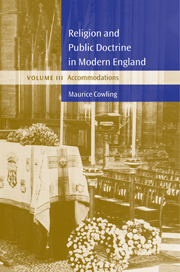Book contents
- Frontmatter
- Contents
- Foreword and acknowledgements
- Introduction
- I The Christian intellect and modern thought in modern England
- II The post-Christian consensus
- 15 Modern knowledge and the post-Christian consensus I
- 16 Modern knowledge and the post-Christian consensus II
- 17 Modern knowledge and the post-Christian consensus III
- 18 Modern knowledge and the post-Christian consensus IV
- 19 English Socialism as English religion
- 20 Literature and the post-Christian consensus
- 21 Modern knowledge and the post-Christian consensus V
- 22 Modern knowledge and the post-Christian consensus VI
- 23 Judaism and the post-Christian consensus
- III Conclusion: religion and public doctrine in modern England
- Notes
- Index of proper names
18 - Modern knowledge and the post-Christian consensus IV
Published online by Cambridge University Press: 23 December 2009
- Frontmatter
- Contents
- Foreword and acknowledgements
- Introduction
- I The Christian intellect and modern thought in modern England
- II The post-Christian consensus
- 15 Modern knowledge and the post-Christian consensus I
- 16 Modern knowledge and the post-Christian consensus II
- 17 Modern knowledge and the post-Christian consensus III
- 18 Modern knowledge and the post-Christian consensus IV
- 19 English Socialism as English religion
- 20 Literature and the post-Christian consensus
- 21 Modern knowledge and the post-Christian consensus V
- 22 Modern knowledge and the post-Christian consensus VI
- 23 Judaism and the post-Christian consensus
- III Conclusion: religion and public doctrine in modern England
- Notes
- Index of proper names
Summary
The moral problem of our age is concerned with the love of money … The decaying religions around us, which have less and less interest for most people unless it be as an agreeable form of magical ceremonial or of social observance, have lost their moral significance … A revolution in our ways of thinking and feeling about money may become the growing purpose of contemporary embodiments of the ideal. Perhaps, therefore, Russian Communism does represent the first confused stirrings of a great religion.
(J. M. Keynes, A Short View of Russia, 1925, in The Collected Works of J. M. Keynes, 1972, vol. IX, pp. 268–9)It is essential for the growth of reason that as individuals we should bow to forces and obey principles which we cannot hope fully to understand, yet on which the advance and even the preservation of civilization depends. Historically this has been achieved by religious creeds and by traditions and superstitions which made man submit to those forces by an appeal to his emotions rather than to his reason. The most dangerous stage in the growth of civilization may well be that in which man has come to regard all these benefits as superstitions and refuses to accept or to submit to anything which he does not rationally understand.
(F. A. Hayek, ‘“Conscious” Direction and the Growth of Reason’, February 1944 in The Counter Revolution of Science, 1955, p.92)He could not tear himself from Cambridge … ‘My last two years of residence’ he said in 1895, ‘were a mistake. […]
- Type
- Chapter
- Information
- Religion and Public Doctrine in Modern England , pp. 468 - 500Publisher: Cambridge University PressPrint publication year: 2001



